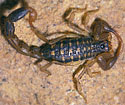|
Uroplectes
(lesser thick-tailed scorpions)
Life
> Eukaryotes
>
Opisthokonta >
Metazoa
(animals) > Bilateria > Ecdysozoa > Panarthropoda > Tritocerebra >
Arthropoda > Arachnomorpha > Cheliceriformes > Chelicerata > Euchelicerata
> Arachnida > Scorpiones
(scorpions)
> Superfamily: Buthoidea > Family: Buthidae
This Afrotropical genus occurs in
a wide range of habitats from Afromontane forest to desert in southern and
eastern Africa. Species can be arboreal occurring under tree bark, in holes in
trees or actively hunting on vegetation or wandering about on the forest floor. Uroplectes
can also be lapidicolous, wandering about at night and
find retreat under any suitable cover by day, or they can be lithophilous
occurring in rock crevices. Further species are psammophilous,
burrowing at the base of shrubs in sandy soil. Uroplectes is very
commonly found in houses on the Cape Peninsula is responsible for most scorpion
stings. Stings often occur when collecting firewood where they shelter. They
generally share forest habitats with Opisthacanthus.
The genus Uroplectes
includes about 40 described species of small to medium (30 to 60 mm) scorpions.
They are very variable in colour; often brightly coloured yellow, orange, brown
and even olive green usually patterned with darker markings.
Uroplectes can deliver an
extremely painful sting that subsides after 1 to 4 hours rarely longer, with the
possibility of slight local swelling. Ice treatment and an analgesic is all that
is required for pain relief. There are some reports that a few species' stings
result in minor systemic symptoms.
Some species in southern Africa
|
Uroplectes carinatus
Occurs over much of western southern Africa but is absent
from the Cape Peninsula in the Western Cape and from the Eastern Cape,
Kwazulu/Natal and Mpumalanga. |

|
|
Uroplectes insignus
Endemic to the forests of the Cape Peninsula in the
Western Cape. |

|
|
Uroplectes lineatus
A Western Cape endemic that occurs from the West Coast
National Park to the Cape Peninsula. |

|
|
Uroplectes
variegatus |
 |
Text and images by
Norman Larsen ©. |
